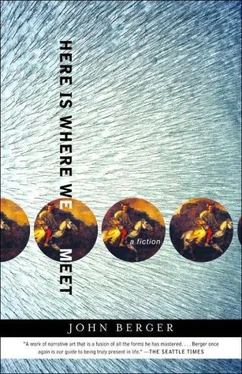Nobody knows, Ken says, how homing pigeons find their way home. When they are flying in clear weather, they can see thirty kilometres ahead, yet this doesn’t explain their unerring sense of direction. During the siege of Paris in 1870, a million messages to the city’s inhabitants were delivered by fifty pigeons. It was the first time that micro-photography had ever been used on that sort of scale. The letters were all reduced, so that hundreds could fit on a tiny film weighing only a gram or two. Then, when the pigeons arrived, the letters were enlarged, copied out and distributed. Strange how things come together in history — colodium film and carrier pigeons!
Some birds have been taken out of their cages and are being expertly examined by the pigeon fanciers. Their crops are being lightly pinched between two fingers, the length of their legs measured, the flat tops of their heads gently pressed by a thumb, their flight feathers extended, and all the while they are being held close against the men’s chests, like trophies.
It’s hard, don’t you think, says Ken taking my arm, to imagine sending news of a total catastrophe by carrier pigeon? The message could announce a defeat, or it could be an appeal for help, but in that gesture of throwing the pigeon up into the sky, so that it heads for home, isn’t there inevitably some hope? Sailors from Ancient Egypt used to release pigeons from their boats on the high seas to tell their families they were on their way home.
I look at the beady red-pupilled eyes of one of the pigeons. He is looking at nothing, because he knows he’s held and can’t move.
I wonder how the chess game is going, I say. The two of us stroll to the other end of the market.
There are sixteen pieces left on the board. Zedrek has king, bishop and five pawns. He is looking up at the sky as if seeking inspiration. Abram looks at his watch. Twenty-three minutes! he announces.
Chess is not a game you can hurry, comments a customer.
He has one good move, whispers Ken, and I bet he’s not going to see it.
Move the bishop to C5, is that it?
No, you idiot, his king to F1.
Tell him then.
Dead men don’t move pieces!
Hearing Ken say these words I suffer his death. He, meanwhile, takes his head in his hands, and with them he turns the head left and right, as if it were a searchlight. He waits for me to laugh as I often did at this clown act of his. He doesn’t see my anguish. I do laugh.
When I came out of the army at the end of the war, he had disappeared. I wrote to him at the last address I had, and there was no reply. A year later he sent a postcard to my parents — the postcard came from somewhere improbable like Iceland or Jersey — asking whether we might all spend Christmas together, which we did. He came with a woman war-photographer who was, I think, Czech. We played Christmas games, we laughed a lot, he teased my mother about buying all the food on the black market.
Between the two of us there was the same complicity. Neither of us looked away or took the slightest step back. We felt the same love: simply the circumstances had changed. The passeur had delivered his charge; the frontiers were crossed.
The years passed. The last time I ever saw him we drove all night with my friend Anant from London to Genève. Driving through a forest near Châtillon-sur-Seine we heard Coltrane on the radio playing ’My Favourite Things’. It was during this journey that Ken told me he was returning to New Zealand. He was then sixty-five. I didn’t ask him why because I didn’t want to hear him say: To die.
Instead I made believe that he would come back to Europe. To which he replied: The best thing there, John, down under, is the grass! There’s no grass as green anywhere else in the world. He said this forty years ago. I never knew exactly when or how he died.
In the Place Nowy, among the stolen hairdryers, the honey-bread with its candied orange peel, the woman who chain-smokes and hopes to sell dresses, Jagusia with her basket now almost empty, the black cherries that have to be sold and eaten quickly because they won’t last, the barrel of salted herring, the voice of Ewa Demarczyk on a CD, singing one of her defiant songs, I suffer his death for the first time.
I do not even glance at where Ken is standing, for he will not be there. I walk alone, past the barber’s, past the soup kitchen, past the women sitting on their stools.
Something pulls me back to the pigeons. When I arrive a man turns towards me, and, as if guessing at my distress — is there another country in the world more accustomed to coming to terms with that emotion? — he hands me, without smiling, the carrier pigeon he is holding.
Its feathers feel slightly damp — like satin. The small ones on its breast have a parting in the middle, as on an owl. It weighs nothing for its size. I hold him against my chest.
I left the Place Nowy, and found, after asking two passers-by, the bankomat. From there I returned to the pension in Miodowa Street and lay down on the bed. It was very hot, hot with the uncertain heat of the eastern plains. Now I could weep. Later I shut my eyes and imagined shuffling a pack of cards.
4 Some Fruit as Remembered by the Dead
Melons seemed to us to be, by a kind of negation, the fruit of drought. Walking through parched valleys, or over the cracked earth of dusty plains, we came upon melons and we ate them as you might draw water from a well in an oasis. They were improbable, they comforted us, but in fact they did not really quench our thirst. Even before they are open, melons smell of a sweet enclosed water. A heavy enclosing smell with no edges to it. Whereas to quench your thirst you need something sharp. Lemons are better.
When small and green, a melon may suggest youth. But quickly the fruit becomes oddly ageless — like a mother to her child. The blemishes on its skin — and there are always some — are like moles or birthmarks. They do not imply ageing as blemishes do on other fruit. They simply confirm that this unique melon is and was always itself.
To somebody who had never eaten one, its exterior would give little idea of what to expect within. The flagrant orange, never seen till the moment of opening, veering toward green. The abundant seeds lying in the central hollow, the colour of pale flames but wet, their placing and clustering defying any clear sense of order. And everywhere the glistening.
The taste of the melon included both darkness and sunshine. It miraculously united these opposites, which can otherwise never exist together.
Our peaches blackened in the sun. A crimson-black to be sure, but with more black in it than red: black like iron which has been heated red-hot and has been slaked and is cooling and gives no warning of the heat it still holds. The peach of the horseshoes.
The black seldom extended over the entire surface. There were parts which, when the fruit was on the tree, were in shadow, and these were whitish, although in the white there was a touch of green, as if the leaves that cast the shadow had just brushed the skin with a finger of their own colour.
In our time, rich European women took enormous pains to keep their faces and bodies as pale as that colour. But never the gypsies.
The size of the peaches varied considerably, from ones large enough to fill the hand, to small ones no bigger than billiard balls. The skin of the smaller ones, being finer, had a tendency to wrinkle very slightly when the fruit was bruised or overripe.
Those wrinkles often reminded us of warm skin in the fold of a dark arm.
In the centre you found a stone, with the texture of a dark bark and an aspect as sulphurous as a meteorite.
Читать дальше












